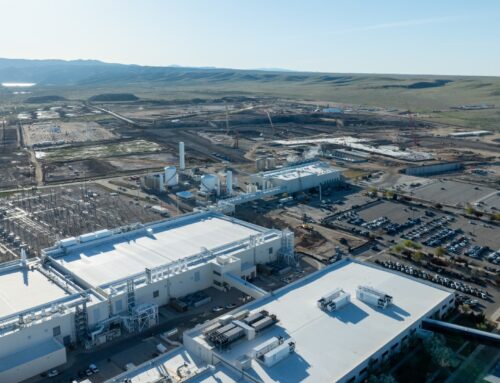Batteries and EVs Drive Bulgaria’s Energy Transition
March 31, 2025
The Energy of Tomorrow conference in Sofia brought together industry leaders to discuss the rapid expansion of renewable energy, the growing electric vehicle (EV) market, and the evolving landscape of gas and hydrogen technologies in Bulgaria.
It is expected that global electricity consumption will grow at the fastest rate in years during the 2025-2027 period. Record-high electricity production from renewable sources and nuclear energy is anticipated to meet almost all additional global demand over the next three years.
Angelin Tsachev, Executive Director of the Electricity System Operator (ESO), highlighted the accelerating shift towards renewable energy. Experts agreed that Bulgaria is moving toward a hybrid energy future, integrating battery storage and wind power to complement the solar boom.
Bulgaria has made notable progress in integrating renewable energy sources into its energy mix over the past decade. In 2018, the share of renewable energy in gross final energy consumption was 20.5%, surpassing the country’s 2020 target. By 2023, this figure had risen to approximately 22.58%.
The EV sector also took center stage, with panelists reporting a 55% increase in sales and registrations in 2023, bringing Bulgaria’s total to over 19,000 electric vehicles. Predictions suggest this number will surpass 100,000 in the next five to six years. Despite this progress, infrastructure challenges remain, with calls for better access to home and office charging stations.
Energy transition demands affordable energy, new tech, and supply diversification
The transition to a low-carbon economy is a powerful driver, but success hinges on two key factors: affordable energy and new technologies.
Gas supply security and the future of hydrogen were also debated. Experts stressed the importance of diversification, noting that Europe must reduce dependence on any single supplier. While hydrogen remains a long-term goal, it is not yet commercially viable due to production and transportation limitations.
“Since 2022, the energy sector has undergone significant changes. Energy security was underestimated, forcing European countries to quickly adapt and take various measures,” said Teodora Georgieva, CEO of ICGB, the operator of the Greece-Bulgaria gas interconnector (IGB). She described the pipeline, which became operational in 2022, as a “white swallow” in Bulgaria, always associated with diversification. She also emphasized that the Vertical Gas Corridor is crucial for energy security, but the EU currently lacks mechanisms to support its development.
Batteries take center stage as Bulgaria’s energy transition advances
According to Alexander Zahariev, Head of Strategy at SUNOTEC, the energy transition must be properly managed to avoid breaking down midway, with batteries playing a key role in this process.
“If the boom of the last three years was focused on solar power, the focus for the next two to three years will be on batteries, and in the following two to three years, wind power plants will start to be integrated,” Zahariev commented.
Last year saw a 55% increase in electric vehicle (EV) sales and new registrations, bringing the total number of electric cars in the country to over 19,000 (both new and used), as discussed in the fourth panel of the Energy of Tomorrow conference on the topic of “E-mobility.” The panel was moderated by Asparuh Iliev, editor at Investor.bg.
“In the next five to six years, electric vehicles in Bulgaria will exceed 100,000,” predicted Milen Hristov, Managing Director of Electrohold IPS. He pointed out that while the current focus is on mass deployment of charging stations, access to home and office charging options is lagging behind. According to him, charging should not be a luxury, as “people’s daily lives don’t revolve around shopping malls.” Hristov expressed hope that with greater charging infrastructure penetration, the number of EVs will also increase.
“In 2024, 4% of all new cars in Bulgaria were electric, which puts the country on par with nations like other CEE countries, like Czech Republic and Greece, in terms of EV market share,” noted Alexander Boychev, Product Manager at Renault Passenger Cars, KEOS Sofia.
He highlighted the challenges posed by subsidy policies for electric vehicle purchases, emphasizing that EU incentives vary between countries.
The Recursive is an official media partner of Energy of Tomorrow.
Search
RECENT PRESS RELEASES
Related Post




